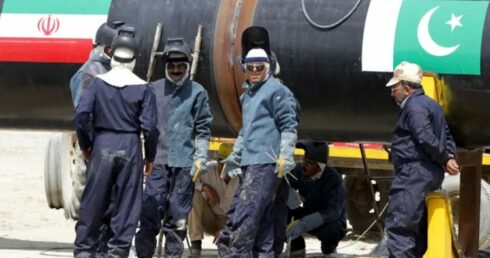Written by Ahmed Adel, Cairo-based geopolitics and political economy researcher
Pakistan has started construction of an 80-kilometre section of a gas pipeline with Iran despite receiving sanction threats from the US. Working against US interests, though, the threat of sanctions only pushes Pakistan not only closer to Iran but also to China and Russia.
Construction for the pipeline from Gwadar in southwest Pakistan to a junction where it can join the Iranian gas pipeline finally started after years-long delays and Washington’s recent threat of sanctions.
“Authorities have commenced the work to begin the construction of the 80-kilometre section of the Pakistan-Iran gas pipeline from Gwadar to a point where it can be connected with the Iranian section of the project,” GEO TV reported.
Citing a senior official of Pakistan’s Energy Ministry, the report added that “the Inter-State Gas Company (ISGS) has already issued tenders seeking the much-delayed re-validation of survey and Front-End Engineering Design (FEED) by consultants. Once this process is completed, the authorities will commence the land acquisition process which will then be followed by the awarding of Engineering, Procurement and Construction (EPC) contract.”
It is recalled that a US State Department spokesperson told reporters in a press briefing on March 26, “We always advise everyone that doing business with Iran runs the risk of touching upon and coming in contact with our sanctions, and would advise everyone to consider that very carefully. We do not support this pipeline going forward.”
Pakistan is suffering from an immense economic crisis, something which can be partially alleviated with the flow of cheap gas from Iran. Yet, despite the economic crisis, the US is not offering any assistance and is instead threatening to worsen the situation by imposing sanctions.
Nonetheless, Pakistan is moving ahead with the project and construction is expected to begin before Iranian President Ebrahim Raisi visits the neighbouring South Asian country on April 22. According to a senior official in Pakistan’s Energy Ministry, the Interstate Gas Company has already issued tenders for the study and preliminary design of the pipeline.
Although the Iran-Pakistan gas pipeline deal was signed in 2009 and projected to be completed in 2015, Islamabad has been holding it up due to sanction threats from the US.
However, Iran, on its part, became impatient and applied further pressure on Pakistan to uphold their end of the deal by sending a third notification in January indicating intentions to seek arbitration over failure to comply with the terms of the agreement. The notification was sent after Iran completed the 900-kilometre leg of the pipeline within its borders.
With Iran announcing intentions to go to arbitration court to receive $18 billion for breach of contract, Islamabad decided in February to implement the first of two phases of the pipeline project, the installation of an 80-kilometre section of the pipeline. Pakistan was given until March to complete its section of the pipeline or face an $18 billion penalty under the Gas Sales Purchase Agreement (GSPA) for the project, a timeframe that has obviously come and gone.
It is unlikely that Iran will push ahead with arbitration in France since Pakistan is urgently laying the 80-kilometre section of the pipeline. The pipeline will initially carry 100 million cubic feet per day of gas, significantly less than the 750 expected over the 25-year project. Following this phase, the authorities will proceed with land acquisition, followed by the awarding of Engineering, Procurement, and Construction (EPC) contracts.
At the same time, Russia is also providing relief for Pakistan at a time when the US only offers sanctions. Russia is now the main supplier of wheat grain to Pakistan, dominating the market with a 70 percent share, a record volume that accounts for almost half a million tons, surpassing the 24.6 percent achieved in 2022. More impressively, Pakistan made half of its payment for Russian grain in the first quarter of 2024 in UAE dirhams and the other half in US dollars, a notable achievement since the first payment in dirhams was only made in November last year.
Pakistan receives cheap gas from Iran, grain from Russia, and tens of billions of dollars of investments from China, meaning US influence in Islamabad is diminishing. The South Asian country’s strength, independence, and stability are against US interests since Washington wants Pakistan to be dependent. However, Washington’s aggressive policy, including sanction threats for engaging in projects to alleviate Pakistan’s economic issues, has had the opposite effect as it has only pushed Pakistan further towards the US’ adversaries – China, Russia, and Iran.





the un are the only ones allowed to legally sanction nations. so why does the us and eu believe they have a right to sanction all they disagree with? plus, if you are not trading in $us or the euro, then what right have they got to interfere?
nobody respects us trannies
it’s not that easy because the us sends “islamic” terrorists who kill foreign workers.
after all these years… yeah they were forced to uphold their end of the deal as iran was pushing them to you know uphold their part.
remember – india investing into one of iran port (chabahar port)? that was back in 2016 and no it is still up in the air.
great for pakistan, on the other hand pakistan will face complete unrest in balochistan province and coup in islamabad to oust the primer
the best “sanction” every one can put on the yankees is no more use of the blood dollar. if you use the blood dollar you are sponcoring terrorisme, trobles all over the planet, bloodshed, wars, genocide…. that blood paper was born from war and genocide against the natif people.